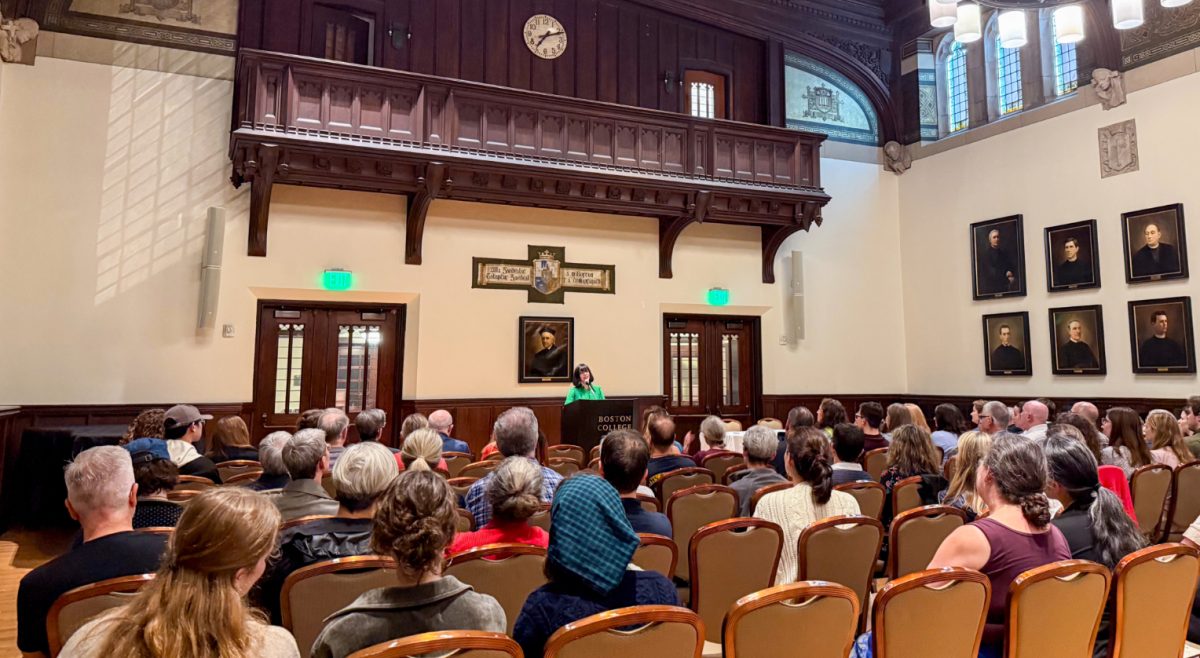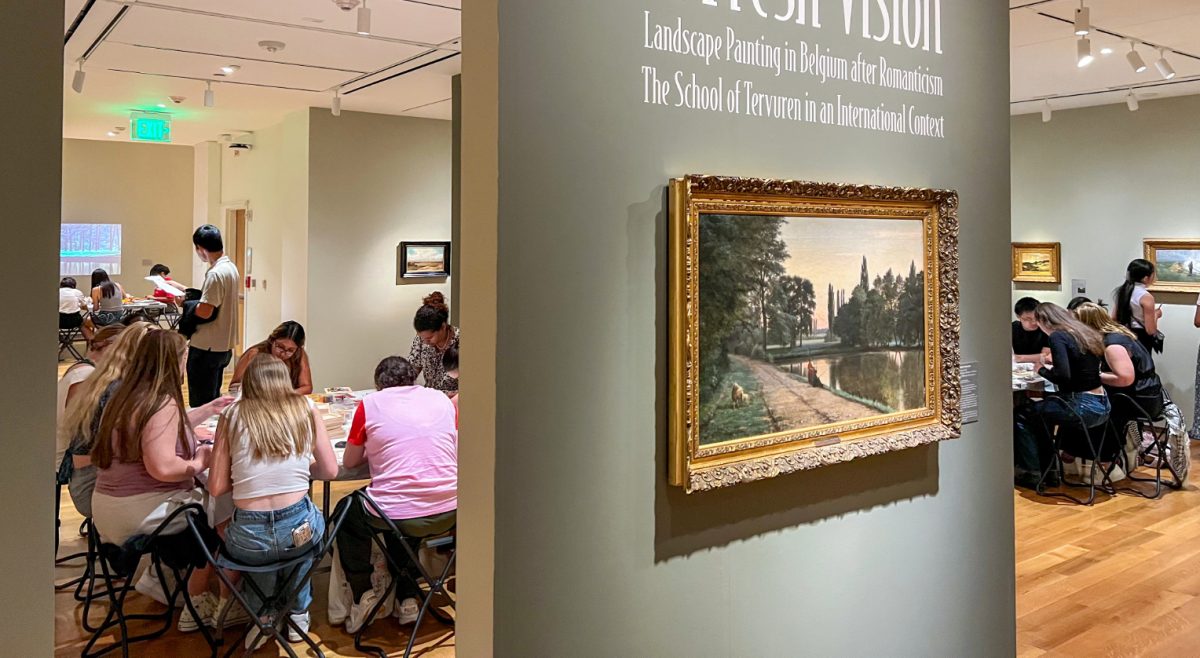Lights swirled and an ominous narration boomed through the speakers in Robsham Theater Arts Center. Images of snowfall and trees faded as the shadows of the scaffolding of oil rigs were projected on the stage. Boston College theatre department’s production of the play Oil transported its viewers across generations as main character May (Emma Thompson, MCAS ’23) travels through time—recounting the discovery of oil and the subsequent construction of global industries centered around the fossil fuel industry.
The performance opened the department’s fall 2021 season on Thursday night and ran through Sunday. Written by the British playwright Ella Hickson, the play initially premiered in London in 2016, and BC’s director Patricia Riggin, who is also an associate professor in BC’s theatre department, has had Oil in the back of her mind for years. When selecting the plays she wants to produce with her students, Riggin said she searches for works written by female playwrights that also provide political and social commentary.
“I hope that [the audience] will look at the history of this, of the oil industry,” Riggin said. “I hope they will think about their dependence on oil and reflect on ‘Where is the balance?’ We can’t go on like this.”
During the rehearsal process, Hickson was able to virtually meet with Riggin and the two student script advisors, known as dramaturges, Grace Cutler, MCAS ’24, and Thompson. Hickson offered guidance and insight into her intentions behind the evolution of the two main characters—May and her daughter Amy.
Oil is divided into five parts, each set in a different time and location. But, the character of May guides the audience through the plot and time travels across periods. In part one, when a businessman, William Whitcomb (Tyler Dean, MCAS ’25), shows May an oil burning lamp that illuminates the stage, May sees the oil and the business deal with Wittcomb as an opportunity. For the rest of the play, Thompson as May guides the audience through the development of the oil industry—what becomes the backdrop to May’s life.
In this leading role, Thompson was onstage every minute of the play, except for her quick costume changes between parts.
“I kind of feel like I’ve been living and breathing Oil for the last two months, but it’s been very, very worth it,” Thompson said.
Bringing the play to the Robsham stage has been an intense process of four-hour rehearsals for five days a week. But, when the curtains came up, the extensive hours of rehearsal paid off as the actors relished being able to perform in front of a live audience again after the COVID-19 pandemic put a stop to them last year.
“I forgot after having not been in a live setting for theatre for so long, like how much the audience does impact like the way you’re performing and the energy you have on stage,” said Abigail Wickman, who plays May’s sister-in-law and MCAS ’24.
The set design, done by Boston-based designer Cristina Todesco, smoothly guided the audience through the five settings of the play. Since the different acts of the play are set in five different locations—Cornwall, Tehran, Hampstead, Kirkuk, and Cornwell—a screen above the stage flashed with the location and the year that the following scenes took place.
The props also reminded the audience where and when the action took place. The desirable resource that characters sought out shifted from the oil in an old-fashioned lamp to a new futuristic machine, called the toroid—the world’s new source of energy in part five, which is set in 2051.
Thought-provoking with nearly every line, the play and its actors invited the audience to consider their own complicity in the oil industry and the exploitation of people and the earth. Part two comments on the imperialist nature of the industry as native people are manipulated for labor. Connecting past injustices with the present, part three displays the disconnection between oil companies and the countries where they extract the resource, as May shows little concern for the people living near her company’s rig in Libya.
In part three—set in Hampstead in 1970—the play blends both the cerebral examination of the oil industry with the emotional conflict between the strong-minded mother and daughter pair. Hickson’s feminist messages shine through as May insists that her daughter Amy (Margaret Whyte, MCAS ’25) leaves behind her clueless boyfriend Nate (Javier Gushe, MCAS ’25) to carve out her own path in the world. The two clash as Amy criticizes her mother’s actions as an oil company executive and May reminds her daughter that she relies on products made from oil, including the gas powering her car and condoms.
“I think it’s a really good reminder that we are all culpable in climate change,” Thompson said. “To a certain extent it’s out of our control, but also we are in charge of holding the people in power accountable for everything that’s going on.”
Given the play’s address of current sustainability issues, Thompson and Cutler reached out to the environmental advocacy clubs on campus to ask if they wanted to be involved. Climate Justice at BC came to Thursday’s opening night performance to hand out flyers in the lobby, sharing its demand for BC to divest from fossil fuels.
In the final scene of the play, the actors stood in formation, filling up the entirety of the stage—their costumes representing different time periods spanning from 1889 to 2051—and the four actors who played Amy as a little girl, teenager, young woman, and middle-aged woman united. Whyte delivered the final line that’s interrupted by the sound of a match being struck—reminding the audience, as the theater lights go down, that they are living through a period of reckoning with the oil industry.
Featured Images by Steve Mooney / For The Heights
Update 10/25/2021 9:16 p.m.: The name of the character William Wittcomb was changed to the correct spelling, William Whitcomb.















